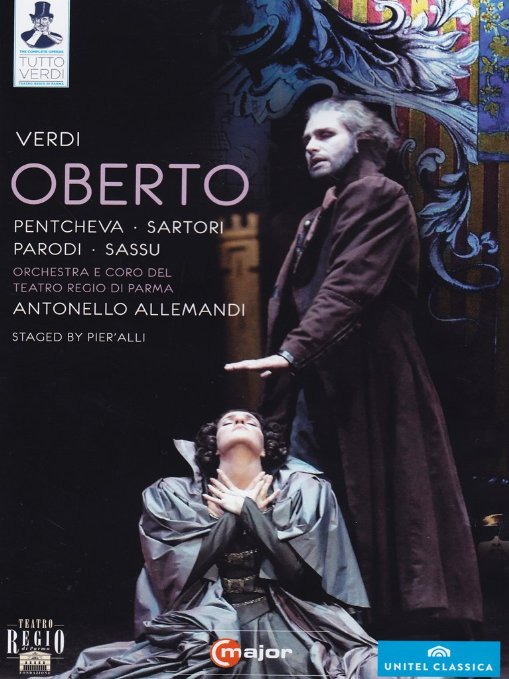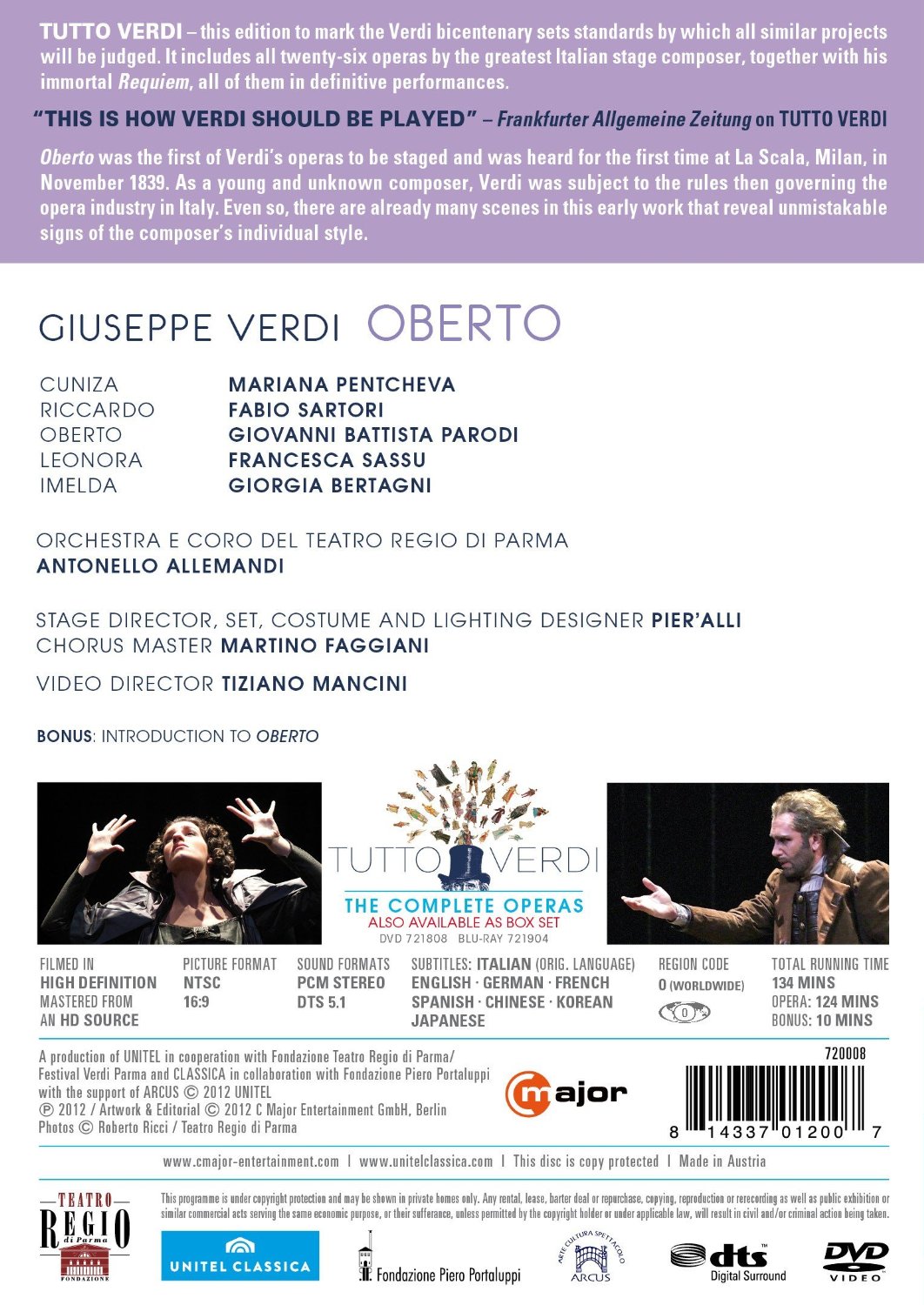Verdi: Oberto / Pentcheva, Sartori, Parodi, Sassu, Allemandi [DVD9]
Conductor: Antonello Allemandi | chorus master: Martino Faggiani | Composer: Giuseppe Verdi | Performers: Giovanni Battista Parodi (Baritone), Mariana Pentcheva (Alto), Fabio Sartori (Tenor), Francesca Sassu (Soprano), Giorgia Bertagni (Mezzo Soprano) | Orchestra/Ensemble: Parma Teatro Regio Orchestra, Parma Teatro Regio Chorus | Label: C Major Entertainment | Multiple Formats, Classical, Color, DTS Surround Sound, NTSC, Widescreen | File hosts: Uploaded.net, share-online.biz | 5% recovery + 3 .rev files | Run time: 134 minutes | 7.98 GB Language: Italian | Subtitles: English, French, Spanish, German
Conductor: Antonello Allemandi | chorus master: Martino Faggiani | Composer: Giuseppe Verdi | Performers: Giovanni Battista Parodi (Baritone), Mariana Pentcheva (Alto), Fabio Sartori (Tenor), Francesca Sassu (Soprano), Giorgia Bertagni (Mezzo Soprano) | Orchestra/Ensemble: Parma Teatro Regio Orchestra, Parma Teatro Regio Chorus | Label: C Major Entertainment | Multiple Formats, Classical, Color, DTS Surround Sound, NTSC, Widescreen | File hosts: Uploaded.net, share-online.biz | 5% recovery + 3 .rev files | Run time: 134 minutes | 7.98 GB Language: Italian | Subtitles: English, French, Spanish, German

Oberto was the first of Verdis operas to be staged and was heard for the first time at La Scala, Milan, in November 1839. As a young and unknown composer, Verdi was subject to the rules then governing the opera industry in Italy. Even so, there are already many scenes in this early work that reveal unmistakable signs of the composers individual style. To celebrate Giuseppe Verdis bicentenary in 2013, C Major is proud to present the truly unique project, TUTTO VERDI: All 26 operas released on DVD and Blu-ray, together with his immortal Requiem and special documentary.
Watch a Trailer (sample is a lower resolution than actual DVD or Blu-ray):
REVIEW: FANFARE: Bill White
The genesis of Giuseppe Verdi’s first opera, Oberto Conte di San Bonifacio is shrouded in some obscurity, but most researchers now agree the young composer probably had nearly three years to write, rewrite, and improve his score. The text itself likely underwent radical surgery with the assistance of La Scala house poet, Temistocle Solera, and Verdi no doubt would have been forced to make some changes to accommodate that as well as rewriting passages to better suit his singers and even adding a new number or two (the quartet in act II is for certain a last minute addition) The time and care Verdi took is evident, the score is full of good tunes, felicitous choruses, and nice orchestral music. If, at times, it sounds like an imitation of Rossini, Bellini, and Donizetti, at least it is a well-crafted imitation. For Verdi fans especially, Oberto is also highly evocative of the much better works to come.
The libretto sadly, detracts rather than enhances the Verdi score. Leonora (soprano) has earlier been seduced and abandoned by Riccardo (tenor) and is seeking retribution as is her papa Oberto (bass), the exiled ex-ruler of the country. After reconciling with one another, father and daughter go seeking the Princess Cuniza (mezzo), Riccardo’s new girlfriend and bride-to-be. Cuniza is aghast at her intended’s vile behavior and sympathetic with Leonora’s plight. (Librettist Solera apparently didn’t get out much with the ladies; Cuniza’s reaction seems quite unlikely.) She orders Riccardo to go back to Leonora and he pretends to agree, but meanwhile Oberto is still spoiling for a fight to restore his daughter’s besmirched honor. The old man and the young gallant fight a duel with long swords and Oberto is killed (better besmirched than be stuck). The shamed Riccardo takes himself off to exile, abandoning both women this time, leaving the girls to sing the big finale by themselves. Cuniza wrings her hands while the grief stricken and heartbroken Leonora says she is going off to a nunnery. Rather a depressing ending, but Verdi scored a modest success with the work despite it, first at La Scala in Milan in 1839, then in other venues up and down the Italian peninsula. Oberto’s success gave a needed boost to Verdi’s confidence and no doubt strengthened his determination to go forward with what was to become a long and remarkable career.
This production is Set No. 1 in the Tutto Verdi project of the Teatro Regio from Parma in partnership with C Major. The goal is to stage and video record all of Verdi’s 26 operas and his Requiem in the Blu-ray format in honor of the great Italian composer’s 200th birthday this year. Most, if not all of the operas are already complete, staged at multiple venues in and around Parma. This Oberto is staged in the small, 300 seat theater in Busetto, Verdi’s hometown. As with Mozart’s Salzburg, the municipal authorities in Busetto prove much more supportive now that the composer is dead and famous than they were when he was actually living there. Staging in the Busetto theater is minimal, generic back and side drops are employed to vaguely suggest a palace setting. For scenes set in the woods the stage is dark. Costumes are attractive but more evocative of the 19th century than the 13th. The stage is so small the Parma chorus actually must spill over into the first row of boxes on either side. Director Pier’alli presents many of the musical set pieces as individual tableaus, starting and stopping the music between many of them. This tactic chops the score of course, it is not what Verdi intended. It would be a disaster to do this in later Verdi where the musical transitions become quite complex and pieces of musical artistry in themselves, but in this early work Verdi’s transitions are rudimentary and sometimes missing entirely, so interrupting the flow in this manner is merely a distraction. Pier’alli also has cast and chorus engaging in some kind of stylized movements and gestures, particularly with hands and arms, a bit like the Japanese Kabuki performers. It is unclear to me exactly what the director is trying to accomplish, but the result is to make interactions between characters look stiff and unnatural, draining away any dramatic impetus from the story.
There is, hard to believe, a second video of Oberto available on DVD from the Opus Arte label and reviewed in these pages by Lynn René Bayley in Fanfare 31:5. Recorded in Bilbao in 2007, that production, staged by Ignacio Garcia provides a bit more natural, if still stylized sets, and more of them. Costumes are more in keeping with period and the acting is more natural and more dramatically viable. Reviewer Bayley fails to inform us that Leonora stabs herself to death in the Bilbao finale, not as written in the libretto, but probably a more appropriate ending. Round 1 then, to Bilbao. Musically, it’s a different story. Except for bass Ildar Abdrazakov in the title role, the singing is pretty mediocre on the Bilbao set. Abdrazakov sings well but cannot match the rich deep vocal quality of Giovanni Battista Parodi on this set. Parodi’s excellent contribution is not only notable in his solo arias but in the satisfying bass line he provides in Verdi’s duets and ensembles. The C Major tenor, Italian Fabio Sartori, also clearly takes the honors in the role of Riccardo. He and his Bilbao counterpart Carlo Ventri both could afford to shed a few kilos, and neither exhibits much in the way of acting skills, but Sartori provides the superior tenor instrument; he is rock solid in intonation and his top notes are thrilling. The ladies on the two sets are more closely matched in vocal quality and technique, but I would give the definite edge to the C Major pair of Bulgarian soprano Francesca Sassu and mezzo Mariana Pentcheva. All of the C Major singers also display an ability to sing the florid bel canto style music Verdi supplies in abundance here, although Cuniza’s pyrotechnic aria in act II is not performed particularly well by either lady. In my opinion, the nod also has to go to the Parma chorus and orchestra under the direction of Antonello Allemandi. Both groups seem to be able to produce a fuller, richer sound with approximately the same limited forces as used in Bilbao. The overture, one of Verdi’s best pieces here, is played particularly well in the Busetto pit. Round 2 then, must go to the new C Major set, evening up the score. But then there is the matter of the high definition picture and audio quality available on the C Major Blu-ray disc. Two notable audio recordings of Oberto exist, one on Philips and one on Orfeo, but both currently are out of print (still available from Internet resellers). Some so-called authorities claim this opera is for Verdi completists only. I think it is better than that. Take your pick then, if you want a copy of Oberto. Perhaps the definitive recorded version is yet to be made, but until then I will put this C Major Blu-ray on my shelf.

CAST Cuniza – Mariana Pentcheva Riccardo – Fabio Sartori Oberto – Giovanni Battista Parodi Leonora – Francesca Sassu Imelda – Giorgia Bertagni
Works on This Recording: Oberto by Giuseppe Verdi Performer: Giovanni Battista Parodi (Baritone), Mariana Pentcheva (Alto), Fabio Sartori (Tenor), Francesca Sassu (Soprano), Giorgia Bertagni (Mezzo Soprano) Conductor: Antonello Allemandi Orchestra/Ensemble: Parma Teatro Regio Orchestra, Parma Teatro Regio Chorus Period: Romantic Written: 1839; Italy Date of Recording: 2007 Venue: Teatro Regio di Parma
No Password


0 comments:
Post a Comment